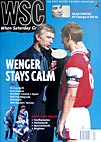 Mike Ticher celebrates the annual bible of facts and figures
Mike Ticher celebrates the annual bible of facts and figures
There is a mistake on page 158 of the 1979-80 Rothmans Football Yearbook. It maintains that on March 27, 1979, Crystal Palace played a 1-1 draw with Crystal Palace.
There have been other glitches scattered throughout its 31 editions – Everton apparently drew three crowds of under 10,000 in their championship season of 1984-85 and a non-existent team was listed as the 1948 Dutch champions for years. But if Rothmans is, as so often claimed, football’s bible, it has proved a much more reliable source over the years than the alleged word of God. That may be about to change – a wrangle over rights to usage of material on the internet is threatening the yearbook’s access to club information from next season.
It’s rare for a big tobacco company to be associated with unbiased statistics, which may be one reason why Rothmans are still keen to have their name attached. But the annual should really be known as Rollin’s Football Yearbook, having been edited by Jack Rollin for 24 of the 31 editions since its inception in 1970 and in collaboration with his daughter Glenda in recent years.
As a writer, Rollin himself would probably admit he is no stylist. “In the simplest of terms, without the aid of of goals matches cannot be won,” he notes in the editorial for 1980-81. However, if his annual is not strictly literature, it is definitely art.
Rothmans may not quite give off the glamour of the Mini or the Spitfire, but it is a British design classic in its own small way. In the very first edition, all the results from the previous season (1969-70) were unhelpfully listed in chronological order. But the following year the familiar club-by-club pattern was established and the book’s essential format has remained unchanged ever since, seamlessly accommodating the transition from the John White Footwear Crowd Behaviour Award (won by Cardiff City in 1970) to the Intertoto Cup.
Of course there have been upsets along the way. Which Rothmans owner does not recoil slightly from the 1995-96 edition, which, for reasons which have never been adequately explained, lists all the League’s players in alphabetical order, instead of by club? Illustrations in the diary section were equally quickly abandoned after just one season, 1983-84, when a variety of famous football folk were represented as gruesome zombies.
There are probably those, too, who grind their teeth and write impassioned letters to the Association of Football Statisticians about Rothmans’ refusal to acknowledge the renaming of the divisions when the Premier League was created, so that, for example, Millwall’s best-ever season is alleged to be 1993-94, when they finished third in the First Division. Annoying, certainly, but it reflects a bloody-minded streak, a refusal to follow fashion which has usually served the annual well. Its disdain for squad numbers and steadfast concern for the affairs of football chaplains (a regular page since the Eighties) fall into the same category.
The beauty of Rothmans is that each edition improves as it gets older. Go back far enough and the diary sections begin to resemble either absurd fantasy (November 23, 1977: “Ipswich beat an off-song Barcelona side 3-0… Johan Cruyff has a mediocre game”) or uncanny premonitions (December 4, 1973: “Liverpool draw 1-1 with Tottenham in the League Cup and the fixtures are piling up. Bill Shankly says: ‘Frankly, I wouldn’t have minded if we’d lost’.”).
And while last season’s results may seem banal, only the most stone-hearted could pick up an old copy and not be instantly distracted by the innumerable stories hinted at in deadpan columns of figures. As the foreword to the first edition points out, “The facts and statistics of a game are not dry bones to be left mouldering. A simple scoreline can recall anxious relegation battles… unnerving cup ties… or perhaps a dour Midland League struggle.”
Opening a random copy at a random page we find ourselves in the thick of Port Vale’s 1986-87 season. It began with a 2-2 draw against Middlesbrough, played in front of 3,456 at Hartlepool (Boro had been locked out of Ayresome Park for failing to pay a tax bill). Bottom of the Third Division on Boxing Day, Vale ultimately finished 12th, grateful for 29 goals (nine pens) from Andy Jones. At 22, Robbie Earle had already racked up 147 games for Vale.
And so it goes on, like a page of links before anyone had heard of the internet – inconsequential but irresistible. The thought that this year’s may be the last Rothmans as we know it makes me more than a little agitated. It’s almost enough to make you take up smoking.
From WSC 164 October 2000. What was happening this month